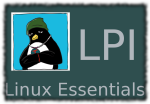 In this objective we take a look at what we mean by “Open Source” software and how Linux was born. Open Source software is available on more platforms than Linux and not all of what is included in a Linux distribution is necessarily Open Source. This document was created in LibreOffice on the Raspberry Pi and this is Open Source software available on a collection of different Operating Systems. Currently this is being edited on a Raspberry Pi but it could quite easily be Windows or a MAC system. Open Source is making the source code of the application available so that users of the software can learn how the program works and contribute to the future development. Of course not all users will want to or be able to work with the source code, this is for software developers; however for those that can code this may be of value. We often talk about free software but free is much more than of no cost ; free is much more about your freedom to use the software how you wish.
In this objective we take a look at what we mean by “Open Source” software and how Linux was born. Open Source software is available on more platforms than Linux and not all of what is included in a Linux distribution is necessarily Open Source. This document was created in LibreOffice on the Raspberry Pi and this is Open Source software available on a collection of different Operating Systems. Currently this is being edited on a Raspberry Pi but it could quite easily be Windows or a MAC system. Open Source is making the source code of the application available so that users of the software can learn how the program works and contribute to the future development. Of course not all users will want to or be able to work with the source code, this is for software developers; however for those that can code this may be of value. We often talk about free software but free is much more than of no cost ; free is much more about your freedom to use the software how you wish.
The term Linux itself refers to the core code in the Linux distribution; Linux is the kernel and is Open Source and freely available. Linus Torvalds, a Finnish student developed this initially in 1991 and in 1992 released the code under the GPL License. Often, although incorrectly, Linux is meant as the distribution. If Linux is the kernel the distribution is the collection of software applications and drivers that make Linux usable on your hardware. Command distributions include :
- Red Hat
- CentOS
- Fedora
- Ubuntu
- SUSE Linux Enterprise Server
- openSUSE
- Debian
- ArchLinux
- Puppy Linux
You may visit the website of an organization to download and obtain copied of the Operating System you wish to use, http://distrowatch.com is a great resource of listing available distributions.
The command uname -r will show your kernel version and lsb_release -a will show your Distribution.
When choosing a Linux Distribution for the Enterprise, be it for Servers or Desktops, you have to consider the support that is provided long term; by support we also include the notion of updates to the OS.
Red Hat: Provide paid support and is often a safe choice for the enterprise
Ubuntu LTS: Long Term Support versions are released every two years and supported for five years. The current version is 14.04 and that will be supported until 2019. Optional paid support is available
CentOS: Is a REd Hat rebuild and provide long term updates and community support
Debian: Is a respected Enterprise version with community Support. The Raspberry Pi OS, Raspbian, is based on Debian.
You will also learn that Linux is used in many devices such as android phones, TiVo boxes and may other household and business appliances. Using a free OS is good sense we keeps the cost of the product down not having to license an OS from a commercial supplier as well as an OS that is supported on many different hardware platforms.
